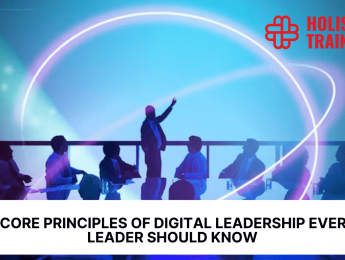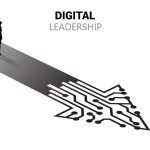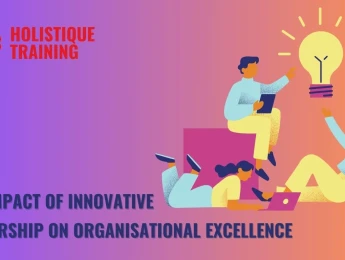- Table of Contents
- Introduction
- How Did Leadership Change in the Past Few Years?
- 1. The Rise of Remote Work and Collaboration
- 2. Data-Driven Decision-Making
- 3. Technological Innovation
- 4. The Importance of Social Media
- 5. Globalisation
- What Are the 7 Core Principles of Digital Leadership?
- #1 Adaptability and Agility
- #2 Empowerment and Trust
- #3 Digital Literacy
- #4 Innovation and Risk-Taking
- #5 Data-Driven Decision-Making
- #6 Collaborative Mindset
- #7 Global Perspective
- Characteristics of a Successful Digital Leader
- Visionary
- Adaptive
- Excellent Communicator
- Empowering
- Data-Driven
- Innovative
- Tech-Savvy
- Global Thinkers
- Inspirational Mentors
- Steps to Become Better at Digital Leadership
- 1. Invest in Continuous Learning
- 2. Cultivate Digital Literacy
- 3. Foster a Culture of Innovation
- 4. Develop Effective Communication Skills
- 5. Lead by Example
- 6. Embrace Data-Driven Decision-Making
- 7. Mentor and Coach
- 8. Stay Agile
- 9. Foster Diversity and Inclusion
- 10. Network and Collaborate
- Digital Leadership in Crisis Management
- Conclusion
Introduction
The world has been evolving at an unprecedented pace in recent years, driven by the relentless surge of digital transformation. From the way we work to how we communicate, every facet of our lives has been influenced by the digital revolution. With these changes come new demands on leadership. In this blog post, we will explore the transformation of leadership in the digital age, the core principles of digital leadership, the characteristics of a successful digital leader, and the steps one can take to become a better digital leader.
How Did Leadership Change in the Past Few Years?
The Economist predicts that digital services will soon become standard offerings across all sectors, transforming the way we experience various spheres of life, leadership included. That being said, let’s explore the profound shifts that have reshaped the leadership landscape in recent years:
1. The Rise of Remote Work and Collaboration
One of the most conspicuous changes in recent years has been the rise of remote work and collaboration. The advent of digital technologies, particularly high-speed internet and sophisticated communication tools, has enabled employees to work from virtually anywhere on the planet. This shift has redefined the traditional office environment and the way teams collaborate.
Before, leaders often managed their teams in the same physical space, facilitating direct interactions and supervision. However, the digital age has made it necessary for leaders to adapt to managing teams dispersed across geographical boundaries. Virtual teams have become commonplace, and leaders must now cultivate skills in managing remote workers effectively.
The underlying cause of this shift can be attributed to advancements in technology, which have made remote work not only feasible but also efficient. Moreover, societal changes, such as the pursuit of work-life balance and the desire for flexibility, have accelerated the adoption of remote work practices.
2. Data-Driven Decision-Making
In the past, leadership relied heavily on intuition, experience, and qualitative information when making decisions. While these attributes are still valuable, the digital age has ushered in a new era of data-driven decision-making. Today, leaders have access to an unprecedented wealth of data, which can inform and guide their choices.
The digital age has seen the emergence of data analytics tools that can process vast amounts of information and extract valuable insights. This newfound ability to harness data has changed the way leaders approach problem-solving and strategy development.
The catalyst for this change is the proliferation of digital technologies that generate copious amounts of data daily. From customer behaviour data to operational metrics, leaders can now rely on objective, quantifiable information to make decisions. The ability to interpret and utilise this data effectively has become a critical skill for modern leaders.
3. Technological Innovation
Another significant change in leadership dynamics is the relentless pace of technological innovation. The digital landscape is characterised by constant disruption, as emerging technologies challenge established norms and open new possibilities.
Traditionally, leaders might have focused on maintaining the status quo or gradual improvements. However, in the digital age, leaders must be open to innovation and willing to embrace emerging technologies. This requires a proactive stance, staying attuned to technological trends, and being ready to pivot when a breakthrough technology disrupts the industry.
The primary driver behind this shift is the exponential growth of technology, which has enabled innovations to occur faster than ever before. The cost of developing and implementing new technologies has decreased, making it easier for organisations to adopt cutting-edge solutions. As a result, leaders who fail to adapt may find their organisations falling behind in the fast-paced digital race.
4. The Importance of Social Media
Social media platforms have become a potent force in shaping public perception and influencing decisions. Leaders can no longer afford to remain distant or disconnected from the digital public sphere. Instead, they must actively engage with their audience and utilise social media to convey their messages and values.
The rise of social media's influence is driven by the increasing interconnectedness of society and the ease of communication provided by digital platforms. These platforms have democratised information dissemination, giving leaders direct access to their constituents and stakeholders.
Leaders who have embraced social media have found new avenues for transparency, advocacy, and brand-building. However, they must also navigate the challenges of maintaining a positive online presence while handling potential crises in the public eye.
5. Globalisation
The digital age has accelerated the process of globalisation. Geographic borders have become less significant as organisations expand their reach and engage with a global audience. Leaders must now operate in a world where diverse cultures, languages, and perspectives intersect.
The driving force behind this globalisation is the accessibility of digital communication and international markets. The ease of connecting with people from different parts of the world has transformed the way businesses operate. Leaders must consider the global implications of their decisions, adapting their strategies to cater to diverse markets and cultures.
In summary, leadership in the digital age has undergone significant transformation due to the rise of remote work, the embrace of data-driven decision-making, the relentless pace of technological innovation, the influence of social media, and the acceleration of globalisation. These changes have redefined the skills, mindset, and approaches that leaders must adopt to navigate the complex and rapidly evolving landscape of the 21st century.
What Are the 7 Core Principles of Digital Leadership?
Digital leadership isn't just about being tech-savvy; it's about embracing a set of principles that guide leadership in the digital era. Here are seven core principles that define digital leadership:
Core Principles of Digital Leadership |
1. Adaptability and Agility |
2. Empowerment and Trust |
3. Digital Literacy |
4. Innovation and Risk-Taking |
5. Data-Driven Decision-Making |
6. Collaborative Mindset |
7. Global Perspective |
1. Adaptability and Agility
Adaptability and agility are the cornerstones of digital leadership. In a rapidly changing digital landscape, leaders must be able to pivot swiftly in response to market demands, emerging technologies, and unexpected challenges. Digital leaders embrace change as an opportunity for growth rather than a threat, fostering a culture within their organisations that values flexibility and innovation. They anticipate change, prepare their teams for it, and are quick to adjust strategies when the need arises.
2. Empowerment and Trust
Digital leaders understand the importance of empowering their teams and trusting them to make decisions. Instead of micromanaging, they provide guidance, set clear goals, and delegate authority. By empowering their employees, digital leaders create a sense of ownership and accountability, which, in turn, fosters creativity and innovation. Trust forms the bedrock of this principle, as leaders believe in the capabilities of their team members and provide them with the freedom to experiment and learn from their experiences.
3. Digital Literacy
Digital literacy is not limited to understanding how to use digital tools; it encompasses a broader comprehension of the digital landscape and its impact on the organisation. Digital leaders possess a foundational understanding of technologies relevant to their industry. They are well-versed in concepts such as artificial intelligence, blockchain, data analytics, and cybersecurity. This digital literacy allows leaders to make informed decisions, communicate effectively with tech-savvy teams, and leverage digital tools to enhance productivity and innovation.
4. Innovation and Risk-Taking
Innovation is the lifeblood of digital leadership. Successful digital leaders foster a culture of creativity and experimentation within their organisations. They encourage their teams to think outside the box, explore new ideas, and challenge existing norms. In fact, Harvard Business Review emphasises that genuine digital transformation can occur when leaders proactively motivate their teams to enhance their skills and provide the necessary support. Moreover, digital leaders are unafraid of taking calculated risks. They understand that failure is an inherent part of the innovation process and view setbacks as valuable learning opportunities. By embracing innovation and risk-taking, digital leaders drive their organisations toward continuous improvement and competitive advantage.
5. Data-Driven Decision-Making
Data is the currency of the digital age. Digital leaders recognise the immense value of data and leverage it to make informed decisions. They invest in robust data analytics tools and processes to collect, analyse, and interpret data relevant to their business operations. By harnessing the power of data, these leaders gain valuable insights into customer behaviour, market trends, and operational efficiency. Data-driven decision-making allows digital leaders to stay ahead of the competition, optimise their strategies, and enhance the overall performance of their organisations.
6. Collaborative Mindset
Collaboration is essential in the digital age, where teams are often dispersed across various locations and time zones. Digital leaders foster a collaborative mindset within their organisations, breaking down silos and encouraging cross-functional teamwork. They leverage digital communication and collaboration tools to facilitate seamless information sharing and idea exchange. By promoting a collaborative culture, digital leaders harness the collective intelligence of their teams, resulting in innovative solutions and enhanced productivity.
7. Global Perspective
The digital landscape has transcended geographical boundaries, making the world more interconnected than ever before. Digital leaders possess a global perspective, considering the international implications of their decisions. They understand diverse cultures, market dynamics, and regulatory environments. By embracing a global mindset, digital leaders can expand their organisations' reach, tap into new markets, and build relationships with international partners and customers.
Incorporating these seven core principles into their leadership approach, digital leaders can navigate the complexities of the digital age with confidence, inspiring their teams to achieve remarkable outcomes and ensuring the long-term success of their organisations.
Characteristics of a Successful Digital Leader
Now that we've explored the core principles of digital leadership, let's delve into the key characteristics that define a successful digital leader:
Visionary
Digital leaders possess a clear and compelling vision of the future. They can see beyond the immediate challenges, envisioning where their organisation should be in the digital landscape. This vision serves as a guiding light, inspiring and aligning their teams toward a common goal. A visionary leader not only sees opportunities but also anticipates potential obstacles, enabling proactive decision-making and strategic planning.
Adaptive
Adaptability is the hallmark of a successful digital leader. The digital landscape is characterised by rapid changes, and leaders must be able to adjust their strategies and approaches swiftly. Adaptable leaders embrace change, viewing it as a catalyst for growth rather than a disruption. They remain open to new ideas, technologies, and methodologies, continuously evolving their leadership style to meet the demands of the digital era.
Excellent Communicator
Communication skills are paramount in the digital age. Digital leaders excel in conveying complex ideas with clarity and precision. Whether it's addressing their teams, stakeholders, or the public, they can articulate their thoughts effectively, ensuring that their messages resonate. In a world saturated with information, the ability to communicate persuasively and authentically is invaluable, fostering trust and credibility.
Empowering
Successful digital leaders empower their teams. They create an environment where employees are encouraged to take initiative, make decisions, and contribute meaningfully. By delegating authority and fostering a culture of empowerment, these leaders inspire creativity and innovation. They trust their team members, allowing them to learn from their experiences and grow both professionally and personally.
Data-Driven
Digital leaders are comfortable with data. They understand the power of data analytics in informing decisions and shaping strategies. These leaders utilise data-driven insights to identify trends, understand customer behaviour, and optimise business processes. By leveraging data, they make informed, evidence-based decisions, gaining a competitive edge and ensuring the relevance of their organisations in the digital marketplace.
Innovative
Innovation is at the heart of digital leadership. Successful digital leaders encourage a culture of innovation within their organisations. They nurture creativity, reward inventive thinking, and provide resources for experimentation. These leaders understand that innovation is not limited to products; it extends to processes, business models, and customer experiences. They embrace calculated risks and view failures as valuable lessons, fostering a culture where innovative ideas can flourish.
Tech-Savvy
While not necessarily technology experts, digital leaders possess a solid understanding of relevant technologies. They comprehend the potential and limitations of digital tools, allowing them to make informed decisions regarding technology adoption and implementation. This tech-savviness enables leaders to communicate effectively with their tech-oriented teams and evaluate the feasibility and impact of emerging technologies on their organisations.
Global Thinkers
Digital leaders have a global perspective. They understand the intricacies of international markets, cultural diversity, and global trends. With the world becoming increasingly interconnected, these leaders appreciate the importance of catering to diverse audiences. They adapt their strategies to suit different cultural contexts, ensuring that their organisations can thrive in the global arena.
Inspirational Mentors
Successful digital leaders invest in mentoring and coaching their team members. They provide guidance, support, and encouragement, helping their employees develop their leadership skills. By serving as inspirational mentors, these leaders create a pipeline of future leaders within their organisations, ensuring continuity and sustainability in leadership roles.
Incorporating these characteristics into their leadership style, digital leaders can not only navigate the challenges of the digital landscape but also inspire their teams to innovate, collaborate, and achieve remarkable success in the ever-changing world of technology and business.
Steps to Become Better at Digital Leadership
Becoming a better digital leader is an ongoing journey. Here are some actionable steps to enhance your digital leadership skills:
1. Invest in Continuous Learning
The digital world is ever-evolving, so your learning journey should be continuous. Enrol in online courses, attend workshops, and participate in webinars to stay updated with the latest technological trends and leadership strategies. Platforms like Coursera, edX, and LinkedIn Learning offer a plethora of courses tailored for digital leaders.
2. Cultivate Digital Literacy
To lead effectively in the digital age, you must be digitally literate. Familiarise yourself with emerging technologies, software, and tools relevant to your industry. Understand basic concepts related to artificial intelligence, data analytics, cybersecurity, and cloud computing. This knowledge not only enhances your decision-making but also facilitates better communication with tech-savvy teams.
3. Foster a Culture of Innovation
Encourage innovation within your organisation. Create a supportive environment where employees are encouraged to propose new ideas, experiment, and take calculated risks. Allocate resources for research and development, and reward innovative solutions. By fostering a culture of innovation, you stimulate creativity and ensure your organisation stays ahead in the competitive digital landscape.
4. Develop Effective Communication Skills
Master the art of communication, especially in the digital realm. Hone your skills in virtual meetings, email correspondence, and social media communication. Clear, concise, and empathetic communication fosters trust and transparency. Practise active listening to understand the concerns and ideas of your team members fully. Effective communication builds strong, collaborative relationships, both within your organisation and with external stakeholders.
5. Lead by Example
Demonstrate the principles of digital leadership through your actions. Be a role model for your team by exhibiting adaptability, embracing change, and leveraging technology. Showcase a strong work ethic, resilience in the face of challenges, and a commitment to continuous learning. Your behaviour sets the tone for the organisational culture and inspires your team to emulate your qualities.
6. Embrace Data-Driven Decision-Making
Enhance your skills in data analytics and interpretation. Understand how to collect, analyse, and derive meaningful insights from data. Familiarise yourself with data visualisation tools and statistical techniques. Make data-driven decisions that are informed, objective, and aligned with your organisation's objectives. Additionally, ensure you are well-versed in data privacy and security to uphold ethical data practices.
7. Mentor and Coach
Invest your time in mentoring and coaching your team members. Identify their strengths and areas for improvement, and provide constructive feedback. Encourage their professional development and guide them in their career paths. By nurturing talent within your organisation, you contribute to a sustainable leadership pipeline, ensuring the continuous growth of your team and the organisation as a whole.
8. Stay Agile
Remain adaptable and open to change. Embrace an agile mindset, enabling you to respond promptly to evolving market demands and technological advancements. Be willing to revise strategies and pivot when necessary. Regularly assess the effectiveness of your initiatives, learn from both successes and failures, and adjust your approach accordingly. Agility is key to staying competitive and relevant in the ever-changing digital landscape.
9. Foster Diversity and Inclusion
Promote diversity and inclusion within your organisation. Embrace diverse perspectives, backgrounds, and experiences, as they lead to more innovative solutions and creative problem-solving. Encourage collaboration among team members from different cultural and professional backgrounds. Create an inclusive environment where everyone feels valued and empowered to contribute their unique insights.
10. Network and Collaborate
Engage with other digital leaders, both within and outside your industry. Attend conferences, seminars, and networking events to broaden your professional circle. Collaborate with peers and thought leaders to exchange ideas, share best practices, and gain fresh perspectives. Networking not only expands your knowledge but also opens doors to potential collaborations, partnerships, and business opportunities.
Digital Leadership in Crisis Management
In the realm of digital leadership, crisis management has emerged as a compelling area of focus. The digital age has not only transformed the way businesses operate but has also altered the nature of crises. Social media platforms, for instance, can turn a minor issue into a full-blown crisis within minutes, demanding swift and strategic response from leaders.
Digital leaders adept in crisis management harness technology to their advantage. During crises, they leverage social media monitoring tools to gauge public sentiment, identify emerging issues, and respond promptly. Transparent communication through official social media channels helps in managing public perception and mitigating reputational damage. Moreover, digital leaders employ data analytics to assess the impact of a crisis on various aspects of their organisation, allowing for data-driven decision-making in real-time.
Additionally, the digital landscape offers innovative solutions for crisis preparedness. Simulated crisis scenarios conducted in virtual environments enable leaders to train their teams effectively, ensuring they respond swiftly and decisively during actual crises. Digital communication platforms facilitate coordination among dispersed teams, allowing for efficient crisis response regardless of geographical barriers.
In essence, digital leadership in crisis management is a testament to the transformative power of technology. Leaders who understand how to navigate the digital landscape during crises not only protect their organisations but also reinforce trust and credibility, showcasing the prowess of digital leadership in the face of adversity.
Conclusion
In the ever-evolving digital landscape, effective leadership is not just a quality; it's a continuous process of growth and adaptation. Digital leaders embrace change, leverage technology, and inspire their teams to achieve extraordinary results. By understanding the core principles of digital leadership, cultivating essential characteristics, and taking proactive steps to improve their skills, leaders can navigate the digital frontier with confidence and lead their organisations to success in the 21st century.
If you're eager to hone your digital leadership skills and embark on this transformative journey, we invite you to explore our comprehensive course, ‘Digital Leadership Skills.’ Designed to empower leaders with practical knowledge and hands-on strategies, this course will equip you with the tools needed to excel in the ever-evolving digital world. Enrol now and embark on a transformative learning experience that will elevate your leadership abilities to new heights in the digital era.
























